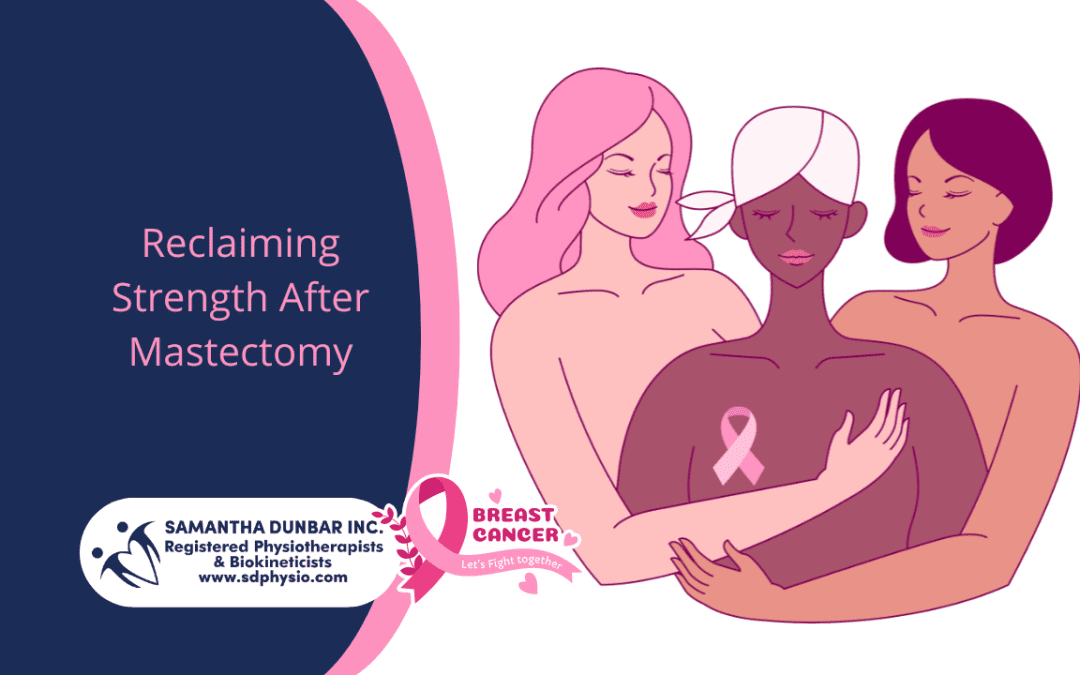Mastectomy, a surgical procedure to remove one or both breasts, is often necessary for individuals diagnosed with breast cancer. While this surgery is a critical step towards recovery, it can leave patients facing physical challenges, such as restricted shoulder movement, swelling (lymphoedema), pain, and muscle weakness. That’s where the roles of physiotherapists and biokineticists come into play, each contributing uniquely to post-mastectomy care.
Why Post-Mastectomy Care Is Important
After a mastectomy, patients often experience:
Reduced mobility: Surgery can lead to tightness and stiffness, especially in the shoulders, making it difficult to perform everyday tasks.
Lymphoedema: The removal of lymph nodes during surgery can result in swelling in the arm, chest, or hand, as your body struggles to drain lymphatic fluid properly.
Weakness: It’s common to feel physically weakened after surgery, especially in the upper body, which eventually affects daily activities. Scar tissue can also cause pain and limit movement.
Pain and discomfort: Surgical scars and nerve damage can cause discomfort.
Proper rehabilitation helps address these issues, preventing long-term complications and enhancing quality of life.
Physiotherapists: Focus on Immediate Postoperative Recovery
Physiotherapists are the go-to professionals in the early stages of recovery, immediately after surgery. Physiotherapists focus on getting you moving again while minimising discomfort and promoting healing during the first stages after surgery.
Their primary goals include:
Reduce swelling: Lymphoedema is a common side effect, but physios have the tools to fight it. Using techniques like manual lymph drainage (a gentle massage), they help reduce swelling and improve lymph flow, so your arm feels less heavy and more like itself again.
Improve mobility: At first, your range of motion might be limited, but physiotherapists help you gradually improve shoulder and arm movement through controlled exercises. The aim is to get you moving without causing any discomfort.
Pain management: Techniques like soft tissue massage, stretching, and electrotherapy help ease pain around the surgical site.
Scar tissue management: Surgery leaves scars, which can sometimes feel tight and uncomfortable. Physios teach you techniques to soften scar tissue and keep it from interfering with your mobility.
Breathing exercises: These help maintain lung function, especially if chest tightness occurs post-surgery.
Biokineticists: Long-Term Strength and Functional Movement
Once the initial recovery is underway, biokineticists step in to enhance functional movement and build strength. They are crucial for helping patients return to normal activities and achieve overall wellness.
Here’s how biokinetics plays a role in post-mastectomy care:
Customised exercise programmes: Biokineticists create tailored exercise regimens aimed at improving strength, flexibility, and endurance. This includes upper body strengthening, core stability, and cardiovascular health.
Posture correction: mastectomy surgery can cause muscle imbalances, leading to poor posture. Corrective exercises ensure long-term physical health and pain prevention.
Functional training: Everyday tasks like lifting, reaching, or even getting dressed can become difficult after surgery. Biokineticists focus on helping patients regain the ability to perform daily activities.
Lymphoedema management: Exercise helps reduce swelling and improve lymphatic circulation, ensuring that fluid buildup is minimised.
Psychological benefits: Regular exercise plays a huge role in boosting mental health, promoting a positive self-image, and reducing anxiety after a mastectomy.
Recovering from a mastectomy is far more than just physical rehabilitation, it’s an emotional and mental journey towards reclaiming your strength, confidence, and independence. While the surgery itself marks a significant milestone in your battle against breast cancer, the recovery process is where you truly start to rebuild your life. And that’s where physiotherapists and biokineticists play a transformative role.
What’s especially powerful about this dynamic duo is how they work together to give you a holistic approach to recovery. From the first steps of post-surgical mobility to the final stages of strength training, their combined efforts help you rebuild not just physically, but mentally. They address the fear, frustration, and uncertainty that often accompanies a major surgery like a mastectomy, providing you with the tools and confidence to embrace your recovery with optimism.
Ultimately, the journey after a mastectomy is deeply personal. It’s about finding your strength again, learning to trust your body, and acknowledging the resilience that got you this far. Physiotherapists and biokineticists are more than just healthcare professionals, they’re your recovery partners, working alongside you as you navigate the challenges and victories of healing. With their support, you’re not just recovering from surgery, you’re reclaiming your life, stronger, wiser, and ready for the future.













